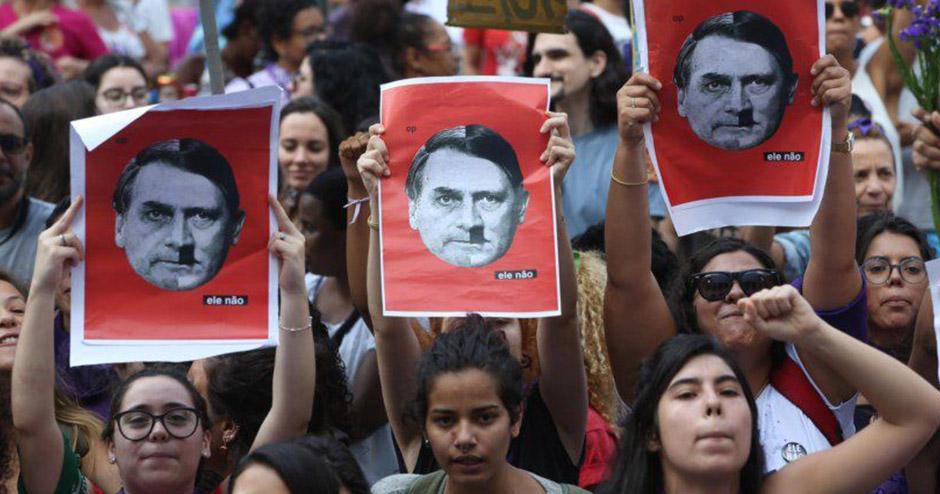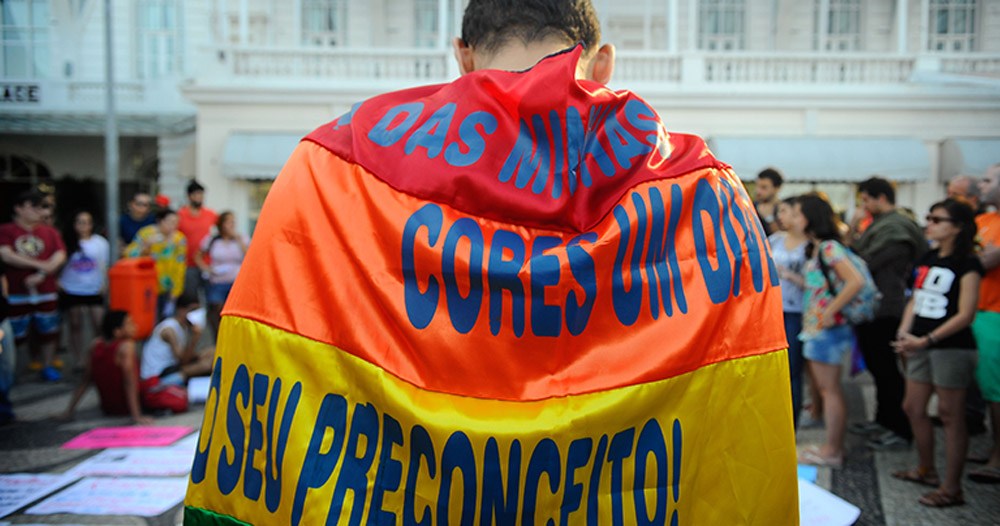Brazil is going through one of the worst crises in its history since the civil-military coup and the establishment of dictatorship in 1964. On October 28, in the second round of the presidential election, Jair Bolsonaro, a Brazilian politician and retired military officer obtained a dramatic 55% of the total votes against Fernando Haddad’s 44% to become the new President-elect of Brazil.
But how did it reach that point? Before that momentous occurrence, Bolsonaro served as a member of the Chamber of Deputies, representing the state of Rio de Janeiro since 1991. During those 27 years in Congress, he was a mostly marginal figure who made occasional headlines with his extreme views on the LGBT+ community, minorities and women.
The outsider congressman represented the tiny Social Liberal Party, (which is very controversial since he is not Social or Liberal, he is actually the total opposite). He managed to win widespread support by promising to lock up crooked politicians and make it easier for police to shoot criminals, for as he stated: “A good criminal is a dead criminal”.
When he began his run, media channels worldwide reported about the danger of him coming to power, while influential people – from the Pope to Madonna – spoke out against what he represented. Voters were warned about the danger to Brazilian democracy, with constant comparisons made between Donald Trump and even Hitler, and the hashtag #ELENAO (#NotHim) was shared millions of times across social media. Human rights groups and defeated left-wing rival Fernando Haddad warned of a possible crackdown on civil liberties if he assumed power.
But the far-right candidate enjoyed the support of the most conservative and reactionary sectors of Brazilian society: the pro-weapons lobby, representatives of large landowners, many industrialists, powerful evangelical churches, part of the army and police forces and those blind with fear and hope for a change, even if it was a bad one. They will bear their responsibility for what awaits Brazil.
During his campaign, Jair shared many of his ignorant and controversial opinions:
• He advocated the sterilization of the poor as a birth control tool.
• He denied that there had been black slavery on the part of the Portuguese.
• Speaking about a woman politician he said: “I would not rape her because she did not deserve it.”
• He said, “The mistake of the dictatorship was only to torture, not to kill”.
• He announced on national TV that he would rather his son be a drug addict or dead than gay.
In a 2013 interview with Stephen Fry – which the British actor later called “one of the most chilling confrontations I’ve ever had with a human being” – the far-right populist claimed “homosexual fundamentalists” were brainwashing heterosexual children to “become gays and lesbians to satisfy them sexually in the future” before declaring, “Brazilian society doesn’t like homosexuals.”
Brazil is already one of the most violent countries in the world: 61,619 homicides were committed in 2017 according to the Brazilian Public Security Forum. Nearly 170 people are killed every day, including a young black man every 23 minutes, a woman every two hours and an LGBT+ person every 19 hours. Human and environmental rights defenders are particularly threatened and increasingly targeted.
One of the biggest concerns about this new government is the impact of Bolsonaro’s hate speech in legitimising his supporters’ hatred towards LGBT+ people. There was already an increase in hate crimes motivated by politics during the presidential campaign, with over 70 cases against LGBT+ people registered during the last three months.

The fear is that now that the person who rules the country is openly homophobic, his supporters will feel that they are allowed to do whatever they want against the LGBT+ community. This could cause irreversible problems in an already violent society already.
As an example of the barbaric cases reported, a 19-year-old woman wearing a top with the hashtag #ELENÃO had a swastika carved onto her stomach by three male supporters of the far-right candidate.
Brazil is not a beacon of rights and equality when it comes to LGBT+ rights. We barely have the right to get married, in fact, there are also risks the few rights that the community already has could be cut.
An alarming situation involves the impact of investments destined for the health care of those with HIV/AIDS.
The health minister evaluates that Brazil has around 830,000 people with HIV, which includes 84% diagnosed cases and 74% receiving treatment. With these indexes, the program created under the government of Fernando Henrique Cardoso, and maintained and expanded in the administrations of Lula and Dilma, made Brazil a world leader in HIV treatment and prevention.
The government provides medication in the public health system to any person who needed it, including PEP (post-exposure prophylaxis) for those potentially exposed to HIV to prevent them becoming infected.
However, things could change as Bolsonaro said during an interview on TV that the state should not provide the medication for free, adding, “It is not my problem if someone got AIDS by injecting drugs and having a promiscuous lifestyle”.
These statements imply questioning any public health programs. An issue of this gravity cannot be simplified by treating it on the basis of a clearly homophobic and reductive point of view. Prevention and treatment of HIV / AIDS is a public health issue and suspending treatments would take the risk of greatly increasing transmission figures.

Since Bolsonaro won the election, he has backed out on many ‘promises’ he made during his campaign.
Mr President’s biggest “weapon” during his campaign was the fight against corruption, but since he got elected he has employed many members of his own family and has been linked to corrupt parties. He is even openly supporting one of the most infamously corrupt politicians in Brazil, Renan Calheiros, for presidency of the Senate.
Bolsonaro has now surrounded himself by the corruption he stood up against.
As a Brazilian, queer, multi-racial, person, I fear for my friends and family, for democracy and for the dark times that are coming.
But this election has taught us a lesson: this was never about if one party was better than another, or if people like one politician more than the other, it was about humanity, human rights, freedom, democracy and equality.
So more than ever, we need to stand together and fight. We will resist!
© 2019 GCN (Gay Community News). All rights reserved.
Support GCN
GCN is a free, vital resource for Ireland’s LGBTQ+ community since 1988.
GCN is a trading name of National LGBT Federation CLG, a registered charity - Charity Number: 20034580.
GCN relies on the generous support of the community and allies to sustain the crucial work that we do. Producing GCN is costly, and, in an industry which has been hugely impacted by rising costs, we need your support to help sustain and grow this vital resource.
Supporting GCN for as little as €1.99 per month will help us continue our work as Ireland’s free, independent LGBTQ+ media.
